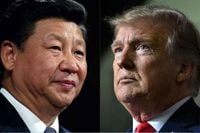In recent developments, the geopolitical landscape has been significantly influenced by the shifting economic strategies of major players, particularly concerning U.S.-China trade relations and the evolving role of cryptocurrencies and gold as safe havens.
According to Jay Jacobs of BlackRock, central banks, especially China, are gradually exchanging American government bonds for gold and even Bitcoin. In a recent interview with CNBC, Jacobs noted that this trend began three to four years ago but has accelerated due to global unrest. A major trigger for this shift was the freezing of $300 billion in Russian reserves by Western countries, prompting many nations, including China, to reconsider where to securely park their money.
Jacobs highlighted a clear trend where countries are seeking to reduce their dependency on the U.S. dollar, opting instead for alternatives like gold and Bitcoin. This movement, he explained, is largely driven by geopolitical tensions, which he identified as the primary catalyst for these changes. As the world becomes increasingly fragmented, central banks are looking for ways to make their finances less vulnerable to political maneuvers. Bitcoin, in this context, is increasingly viewed as a form of digital gold—a place to store wealth that is not directly tied to stock markets or political decisions.
“We see more and more money flowing into gold ETFs, but also into Bitcoin,” Jacobs stated. “Investors are looking for something that follows its own path, independent of the whims of the stock market.” This sentiment is echoed by Alex Svanevik, CEO of the crypto platform Nansen, who pointed out that Bitcoin is increasingly detaching from the American stock market, behaving more like gold than a tech stock from the Nasdaq.
In light of economic uncertainty, Bitcoin has shown remarkable stability compared to many other cryptocurrencies and traditional stock exchanges. Analysts from QCP Capital also noted that Bitcoin is regaining its status as a safe haven, especially as stock markets face significant challenges. If this sentiment continues to grow among major investors, it could significantly boost the influx of institutional money into Bitcoin.
Meanwhile, the ongoing trade war initiated by President Donald Trump is exacerbating economic tensions. The U.S. administration's imposition of tariffs on various goods has led to a global trade conflict, with countries like China and Japan grappling with the repercussions. On April 27, 2025, U.S. Treasury Secretary Scott Bessent stated that he had discussions with Chinese officials during the IMF meetings in Washington, but tariffs were not on the agenda.
Despite Trump's aggressive trade policies, including threats to impose higher tariffs on countries that do not reach deals, there is a growing sentiment among global leaders that cooperation is essential. Former DNB president Nout Wellink expressed skepticism about Trump's potential to fire Federal Reserve Chairman Jerome Powell, stating, “I don’t think this will happen, considering it’s nearly impossible to dismiss him.”
In the consumer market, the impacts of anticipated tariffs are already being felt. The fast fashion site Shein has raised its prices in the U.S. in anticipation of new import duties that will affect small packages from China. Popular care products have seen price increases exceeding 50%, while women’s clothing has risen by 8% and home and kitchen products by over 30%.
China, for its part, has denied claims of ongoing trade talks with the U.S., despite President Trump’s assertions that communication is taking place. The Chinese Ministry of Commerce reiterated that there are no negotiations happening regarding tariff issues, characterizing Trump's statements as misleading. They emphasized that if the U.S. truly wishes to resolve these issues through dialogue, it must first correct its mistakes and cease pressuring other nations.
In the financial markets, the stock exchanges in New York showed a positive trend on April 25, 2025, with the S&P 500 gaining 0.7% and the Nasdaq rising 1.3%. The Amsterdam stock exchange also closed slightly higher, reflecting a broader trend of cautious optimism among investors.
However, the economic outlook remains uncertain. The German government has projected stagnation for its economy this year, largely due to the impacts of Trump's trade policies. A recent report noted that the economic activity in the Eurozone barely grew in April 2025, with the ongoing trade tensions contributing to this stagnation.
In a broader context, Klaas Knot, president of the DNB, highlighted the potential for the euro to become a more widely used currency as confidence in the dollar wanes due to Trump’s policies. “A question that arises is to what extent the dollar can still be considered a safe haven,” he remarked, suggesting that the current situation presents an opportunity for the euro.
The International Monetary Fund (IMF) has warned of the risks associated with geopolitical unrest, stating that such factors could lead to increased borrowing costs for governments and disrupt global trade and investment flows. The IMF’s latest report indicated that the risks to global financial stability have increased significantly, with investment valuations still considered high.
As the situation evolves, the interplay between cryptocurrencies, traditional safe havens like gold, and the shifting dynamics of international trade will continue to shape the global economic landscape. Investors are increasingly seeking refuge in assets that offer stability amid the chaos, and the response of central banks to these challenges will be crucial in determining the future trajectory of financial markets.
With tensions high and uncertainties looming, stakeholders across the globe are watching closely to see how these developments will unfold and what implications they may have for international relations and economic stability.

